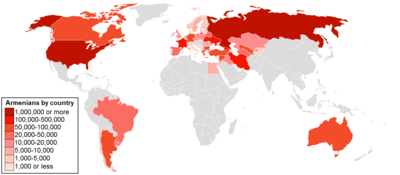Armenians in Germany
| Total population | |
|---|---|
| 80,000 - 100,000 [1] | |
| Regions with significant populations | |
| North Rhine-Westphalia, between the cities of Cologne and Düsseldorf, Hesse (here majority of Armenians living in Frankfurt) and Hamburg, Sufficiently strong Armenian community in Berlin (about 6,000 people) and Munich, which are also fairly typical places of residence immigrants. | |
| Languages | |
| Armenian, German | |
| Religion | |
| Armenian Apostolic, Armenian Catholic | |
| Related ethnic groups | |
| Armenian diaspora | |
Armenians in Germany are ethnic Armenians living within the modern republic of Germany. Like much of the Armenian diaspora, most Armenians immigrated to Germany after the Armenian genocide of 1915. Others came later, fleeing conflicts in places like Iran, Azerbaijan and Lebanon. Another influx came fleeing nationalist persecution in Turkey. After World War II, many Soviet Armenians, former POWs in particular, fled to the American occupied areas of Germany. While many traveled on, some settled in the country, providing a base for later asylum-seekers.[3]
History[]
The first Armenian organization was the Armenian Colony of Berlin, established in 1923.[3] By 1975, Armenian associations would be established in Hamburg, Berlin, Cologne, Frankfurt, Stuttgart and Munich. In the 1980s, other associations were created in Bremen, Braunschweig, Bielefeld, Duisburg, Neuwied, Bonn, Hanau, Eppingen, Nuremberg, Kehl and elsewhere.[3]
Presently, there are about 35,000 naturalized Armenians and 15,000 asylum-seeking Armenians living in Germany today. Their population is concentrated in Mecklenburg-Western Pomerania, many of which are Armenian asylum-seekers from Armenia, for whom the Armenian Church provides services, baptisms, Bible readings and community support. The Diocese of Germany bears all the costs of supporting Armenians from post-Soviet Armenia and regards this service as part of its mission.[3]
Notable people[]
See also[]
- Armenia–Germany relations
- Armenians Diaspora
- German-Armenian Society
References[]
- ^ (in Russian) [1] in "Noravank" Scientific-Research Foundation
- ^ Armenian diaspora in Germany (PDF), Yerevan: "Noravank" Scientific-Research Foundation, 2006[permanent dead link]
- ^ a b c d "Armenian Reporter Online". Archived from the original on 2008-07-05. Retrieved 2007-04-28.
External links[]
- Armenian diaspora by country
- Ethnic groups in Germany
- Middle Eastern diaspora in Germany
- Armenia–Germany relations
- German people of Armenian descent
